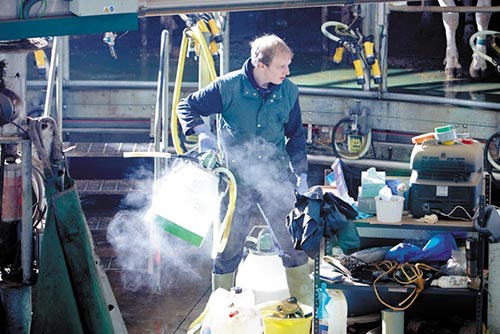Farm Energy Challenge: client promotion

British farmers could slash their energy bills by up to a quarter, by adopting simple energy-saving ideas. Take a look at our Farm Energy Challenge to see what you could save.
It may not be glamorous. It may not be exciting. But cutting unnecessary costs is something everyone should be interested in.
That’s why Farmers Weekly has teamed up with E.ON to launch the Farm Energy Challenge – a series of features following two very different farms in their bid to reduce energy bills. We will showcase how different energy-saving options really work in practice; how they affect overall farm management; and what impact each has on individual farm costs.
Rising energy prices
On average, farm energy bills have doubled over the past 10 years. Although farmers can do little to prevent rising wholesale prices, they can take action to improve energy efficiencies, says Andrew Kneeshaw, managing director of the Farm Energy Centre, which is working with E.ON under its Gateway business arm.
British farmers are already making great strides in producing more for less. “Over the past 10 years, large pig, poultry and horticulture producers have cut energy usage by 20-30% under the Climate Change Agreement,” says Mr Kneeshaw. “Technology has moved on apace, and there are considerable opportunities for farmers to improve energy efficiencies and, in doing so, reduce unnecessary costs.”
As part of the Farm Energy Challenge, E.ON experts will visit the two farms and carry out an energy audit, identifying where energy is being used, and suggest ways in which consumption can be cut. Each farm will be given a budget of up to £5,000 to spend on energy efficient equipment, and Farmers Weekly will follow their progress over the next few months.
But it’s not just the two case study farmers who stand to benefit. All farmers can implement small changes with E.ON’s Energy Toolkit – a new package of help and advice to help farming customers tackle energy costs. It includes a free helpline through Gateway to offer farm-specific advice, and a free business energy monitor, which provides a real-time display of energy usage, to identify which areas to tackle first.
“We know farmers are busy people, and don’t want to spend hours analysing energy bills,” says Iain Walker, head of small and medium enterprises at E.ON. “No business wants to waste money, which is why we’ve worked with long-standing industry experts to produce our Energy Toolkit and help our farming customers tackle their energy bills. By fitting an energy monitor or a smart meter, the short time invested in seeing how your energy use stacks up, and making some simple changes, could pay massive dividends.”
Changing energy use
Easy measures to reduce energy usage include turning off lights and equipment, insulating buildings, replacing inefficient equipment, and running grain driers or water heaters during off-peak times. In a future of sustainable intensification, farmers’ use of energy will continue to change, says Mr Kneeshaw. “We are getting cleverer at what we do; feeding information into overall farm management is becoming increasingly integral. Energy efficiency is the next stage of precision farming.”
Better technology means it is far easier for farmers to monitor their energy use and adjust it remotely using timers, sensors and wireless controls, says Mr Walker. “The industry is always going to need energy to farm effectively. Improving efficiencies and slashing costs now is just the first step to a sustainable future, but a vital one.”
To find out how we worked out these savings go to eonenergy.com/details
See also:Farm Energy research
Read the Farm Energy Challenge articles:
 Visit E.ON’s Energy Toolkit at eonenergy.com/fw
Visit E.ON’s Energy Toolkit at eonenergy.com/fw
British farmers could slash their energy bills by up to a quarter, by adopting simple energy-saving ideas.
Take a look at our Farm Energy Challenge to see what you could save.
